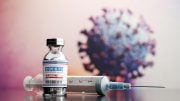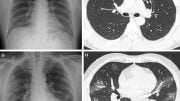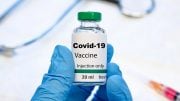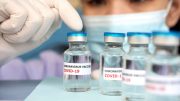
Data were collected before booster vaccine recommendation.
The first study to evaluate the clinical characteristics and outcomes of fully vaccinated patients with cancer who had breakthrough COVID-19 infections indicates they remained at high risk for hospitalization and death.
The study, published today (December 24, 2021) in Annals of Oncology showed that fully vaccinated patients who experienced breakthrough infections had a hospitalization rate of 65%, an ICU or mechanical ventilation rate of 19%, and a 13% death rate. The study was conducted by the COVID-19 and Cancer Consortium (CCC19), a group of 129 research centers that has been tracking the impact of COVID-19 on patients with cancer since the beginning of the pandemic.
“Patients with cancer who develop breakthrough COVID-19 even following full vaccination can still experience severe outcomes, including death,” said Toni Choueiri, MD, director of the Lank Center for Genitourinary Care at Dana-Farber Cancer Institute and a senior author on the report. “That is why a multilayered approach that includes masking and social-distancing, along with vaccination plus booster against COVID-19 remains an essential approach for the foreseeable future.”
Patients were considered fully vaccinated after having received two doses of either the BioNTech, Pfizer vaccine or the Moderna, NIAD vaccine, or one dose of the J&J vaccine, with the last vaccine dose long enough before breakthrough COVID-19, to consider them as fully vaccinated. The data were collected between November 1, 2020, and May 31, 2021, before booster vaccines were recommended for patients with cancer by the U.S. Centers for Disease Control and Prevention.
“Because measures of immunity are not routinely collected in clinical care, we don’t know whether these were patients who mounted effective immune responses after vaccination; a lot of emerging data have suggested that patients with cancer, especially blood cancers, don’t mount adequate protective antibody responses. It’s important to note that many of the same factors that we identified prior to the availability of vaccination – age, comorbidities, performance status, and progressing cancer – still seem to drive many of the bad outcomes,” said Jeremy Warner, MD, director of the CCC19 Research Coordinating Center, associate professor at Vanderbilt-Ingram Cancer Center and a senior author of the study.
The consortium identified 1,787 patients with cancer and COVID-19 for the study, the vast majority of which were unvaccinated. The number of fully vaccinated was 54, and 46% of those fully vaccinated had reduced levels of lymphocytes — the T cells and B cells responsible for immunological responses to viruses. Lymphopenia commonly occurs in patients with cancer receiving anti-CD20 monoclonal antibodies or CAR-T-cell treatments for hematologic malignancies, including lymphoma and leukemia. The study appears to support previous observations that patients with hematologic malignancies are at greater risk for severe outcomes from COVID-19. However, the number of patients in the study is too small to make definitive conclusions about specific types of anticancer therapies that might be associated with breakthrough infections, the researchers noted. Patients on a treatment regimen of corticosteroids also appeared to be more susceptible to hospitalization.
“Similar results (high mortality rates among fully vaccinated individuals) have been reported in other immunocompromised patient populations, such as organ transplant recipients, prior to the utilization of additional vaccine doses. These findings come at a time of concerns that immune escape mutants such as the omicron strain may emerge from chronically infected patients with weakened immune systems. Thus, the immunosuppressed and their close contacts should be target groups for therapeutic and preventive interventions, including community-level outreach and educational efforts,” said Dimitrios Farmakiotis, MD, an infectious disease clinician at the Warren Alpert Medical School of Brown University and a senior author of the study.
Reference: “COVID-19 Vaccination and Breakthrough Infections in Patients with Cancer” by A.L. Schmidt, C. Labaki, C.-Y. Hsu, Z. Bakouny, N. Balanchivadze, S.A. Berg, S. Blau, A. Daher, T. El Zarif, C.R. Friese, E.A. Griffiths, J.E. Hawley, B. Hayes-Lattin, V. Karivedu, T. Latif, B.H. Mavromatis, R.R. McKay, G. Nagaraj, R.H. Nguyen, O.A. Panagiotou, A.J. Portuguese, M. Puc, M. Santos Dutra, B.A. Schroeder, A. Thakkar, E.M. Wulff-Burchfield, S. Mishra, D. Farmakiotis, Yu Shyr, J.L. Warner and T.K. Choueiri, on behalf of theCOVID-19 and Cancer Consortium, 24 December 2021, Annals of Oncology.
DOI: 10.1016/j.annonc.2021.12.006
The study’s lead authors are Andrew Schmidt, MD; Chris Labaki, MD; Ziad Bakouny, MD, all from Dana-Farber Cancer Institute; and Chih-Yuan Hsu, PhD, of Vanderbilt-University Medical Center. The senior authors are Choueiri of Harvard, Farmakiotis of Brown University, and Warner and Yu Shyr, PhD, of Vanderbilt University Medical Center. Other contributors include Nino Balanchivadze, MD; Stephanie Berg, DO; Sibel Blau, MD; Ahmad Daher, MD, PhD; Talal El Zarif, MD; Christopher Riese, PhD, RN; Elizabeth Griffiths, MD; Jessica Hawley, MD; Brandon Hayes-Lattin, MD; Vidhya Karivedu, MBBS; Tahir Latif, MBBS, MBA; Blanche Mavromatis, MD; Rana McKay; MD; Ryan Nguyen, DO; Orestis Panagiotou, MD, PhD; Andrew Portuguese, MD; Matthew Puc, MD; Miriam Santos Dutra, PhD; Brett Schroeder, MD; Astha Thakkar, MD; Elizabeth Wulff-Burchfield, MD, and Sanjay Mishra, PhD.








Keep taking the jab. A hahahahahahahahahaoooohahahahahahahahahahaha.
Headline is just plain wrong. Not that anyone edits this site. But, fwitw, it needs the word “cancer” inserted.
Our healthcare system is about to experience a tsunami! Potential side effects of jabs include chronic inflammation, because the vaccine continuously stimulates the immune system to produce antibodies. Other concerns include the possible integration of plasmid DNA into the body’s host genome, resulting in mutations, problems with DNA replication, triggering of autoimmune responses, and activation of cancer-causing genes. Alternative COVID cures exist. Ivermectin is one of them. While Ivermectin is very effective curing COVID symptoms, it has also been shown to eliminate certain cancers. Do not get the poison jab. Get your Ivermectin today while you still can! https://medicalfreedom.wiki/
Really? Re the last comment above. If you don’t understand the most elementary elements of virus replication including their ability to mutate to stronger versions with each new iteration then you shouldn’t comment on a scientific topic especially those that involve health and mortality. The vaccine does NOT enter the nucleus of the cell and does NOT alter DNA. The MRNA vaccine program is A scientific leap forward in virus prevention . The use (abuse ) of Ivermectin has been debunked repeatedly.
What is Polyethylene Glycol and why is in the Pfizer and Moderna vaccines?